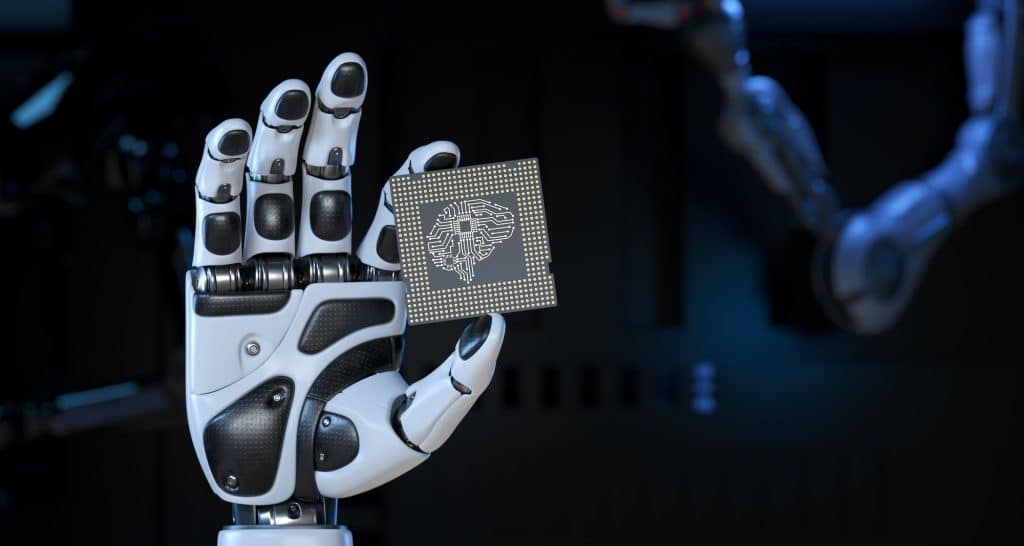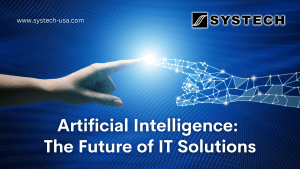Artificial Intelligence (AI) is being increasingly utilized in the IT industry to create innovative solutions for various business problems. AI-powered IT solutions can automate manual tasks, improve decision-making processes, and increase efficiency.
Artificial Intelligence (AI) refers to the simulation of human intelligence in machines designed to think and act like humans. These intelligent machines can be trained to perform tasks such as recognizing speech, making decisions, and solving problems, by analyzing vast amounts of data and recognizing patterns in that data. AI systems can learn from experience, adjust to new inputs, and perform human-like tasks without being explicitly programmed. AI has the potential to transform a wide range of industries, including healthcare, finance, and transportation, by automating many manual processes and enabling faster and more accurate decision-making.

Information Technology (IT) solutions refer to the various technology-based products and services designed to address specific business problems or improve the efficiency of different business processes. IT solutions can encompass multiple technologies and services, including hardware, software, and cloud computing services. IT solutions aim to provide organizations with the tools and resources they need to streamline their operations, improve decision-making processes, and increase overall efficiency.
IT solutions can be used in a variety of industries, including healthcare, finance, retail, and manufacturing. Some examples of IT solutions include enterprise resource planning (ERP) systems, customer relationship management (CRM) software, data analytics tools, and cybersecurity solutions. These solutions can be customized to meet the specific needs of each organization, ensuring that they can effectively address their business challenges and reach their goals.
In addition to providing the infrastructure and data needed for Artificial Intelligence, the IT industry is also actively developing and implementing AI technologies to create innovative solutions for various business problems. From chatbots and virtual assistants to predictive maintenance systems and personalized marketing campaigns, AI is used in many IT solutions to improve efficiency, automate manual tasks, and provide organizations with actionable insights and recommendations.
Here are Top Industries Where Artificial Intelligence Is Being Used:
- Customer Service
AI-powered chatbots and virtual assistants are being used to handle customer queries and support requests, reducing the workload on human customer service representatives.
These Artificial Intelligence systems use natural language processing (NLP) and machine learning algorithms to understand and respond to customer inquiries in real-time, without human intervention. This can reduce the workload on human customer service representatives, freeing them up to focus on more complex tasks and improving overall efficiency.
In addition to handling customer inquiries, AI-powered chatbots, and virtual assistants can also provide organizations with valuable insights into customer behavior and preferences, allowing them to make informed decisions about improving their customer service processes. These AI systems can also be trained to recognize patterns in customer inquiries and provide personalized responses, improving the overall customer experience.
- Cybersecurity
Artificial Intelligence algorithms can detect and prevent cyber attacks in real-time, analyzing large amounts of data to identify potential security threats.
AI algorithms can be trained to recognize patterns and anomalies in network traffic and system activity, which can indicate the presence of a cyber attack. By continuously monitoring network activity and analyzing large amounts of data in real time, AI systems can identify potential threats and respond quickly to prevent them from causing damage.

Moreover, AI algorithms can also be used to analyze data from various sources to identify potential security vulnerabilities, allowing organizations to take proactive measures to secure their systems. For example, AI algorithms can be used to analyze code and identify potential security weaknesses in software applications, helping organizations to develop more secure software.
- Data Analysis
Artificial Intelligence algorithms can analyze large amounts of data to uncover hidden patterns and insights, enabling organizations to make more informed decisions.
By analyzing data from various sources, such as customer behavior patterns, sales data, and market trends, AI algorithms can provide organizations with valuable insights into their business operations, helping them to identify areas for improvement, make better-informed decisions, and gain a competitive edge.
For example, AI algorithms can analyze customer behavior patterns to identify trends and preferences, allowing organizations to target their marketing efforts more effectively. AI can also be used to analyze sales data to identify areas of growth and opportunities for expansion, as well as identify potential challenges or weaknesses in the sales process.
- Predictive Maintenance
Artificial Intelligence algorithms can be used to analyze data from Internet of Things (IoT) devices to predict when equipment may fail, allowing organizations to perform maintenance before it is too late.
This approach is known as predictive maintenance, and it can be incredibly valuable for organizations looking to minimize downtime, reduce maintenance costs, and improve overall equipment reliability.
By analyzing data from IoT devices in real time, AI algorithms can identify patterns and anomalies that may indicate that equipment is starting to wear down or malfunction. This information can then predict when equipment will fail, allowing organizations to perform maintenance before the equipment breaks down, reducing the risk of unexpected downtime and costly repairs.
- Image and Speech Recognition
Artificial Intelligence algorithms can be used to analyze images and speech, making it possible to develop solutions such as facial recognition software, voice-activated virtual assistants, and speech-to-text transcription software.
Facial recognition software uses Artificial Intelligence algorithms to analyze images and identify unique facial features, allowing it to identify individuals accurately. This technology is used in various applications, such as security systems, marketing, and customer engagement.

Voice-activated virtual assistants use AI algorithms to analyze speech, allowing users to interact with technology using natural language. This technology is used in products such as smart speakers and virtual personal assistants, providing a more intuitive and convenient way for people to interact with technology.
Speech-to-text transcription software uses AI algorithms to transcribe speech into written text, making it possible to convert audio recordings into written documents automatically. This technology is helpful in a variety of applications, such as dictation, accessibility, and audio-to-text conversion.
- Personalized Marketing
Artificial Intelligence algorithms can be used to analyze customer data to create personalized marketing campaigns, increasing the effectiveness of marketing efforts.
In addition to creating personalized marketing campaigns, AI algorithms can also analyze customer feedback and preferences, allowing organizations to make data-driven decisions about product development, pricing, and marketing strategies.
Overall, Artificial Intelligence algorithms provide organizations with a powerful tool for analyzing customer data and creating highly targeted marketing campaigns, helping them to reach their target audience more effectively and improve their marketing results.
Conclusion
Artificial Intelligence is becoming an essential component of IT solutions, helping organizations to improve processes, reduce costs, and create new business opportunities. AI is closely related to the IT industry because it relies on advanced computer systems, software, and data. IT systems provide the infrastructure and tools necessary to collect, store, and manage the vast amounts of data that AI algorithms need to operate effectively. AI systems require large amounts of data to be trained and analyzed, which is where IT comes in.
Overall, AI and IT are interrelated and dependent on each other, with AI providing the intelligence and decision-making capabilities that drive IT solutions and IT providing the infrastructure and tools necessary for AI to operate effectively. Thus, getting an IT solutions provider with expertise in AI will greatly help any organization or enterprise. With AI on the rise, businesses will shift to IT solutions that will provide a competitive advantage in the market.





